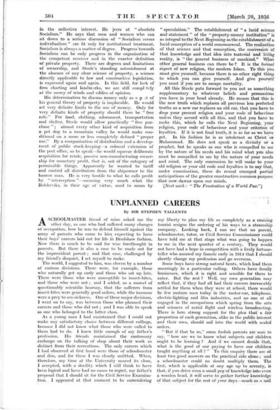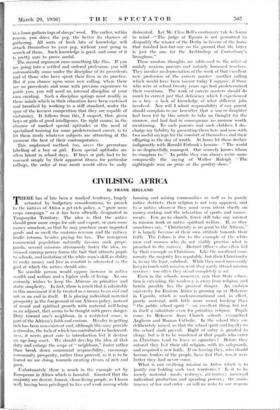UNPLANNED CAREERS
By SIR STEPHEN TALLENTS
ASCHOOLMASTER friend of mine asked me the other day, as one who had suffered many changes of occupation, how he was to defend himself against the army of parents who came to him expecting to have their boys' careers laid out for life in Bradshaw fashion. Now there is much to be said for wise forethought in parents. But there is also a case to be made out for the improvident parent ; and that case, challenged by my friend's disquiet, I set myself to make.
The world, I suggested to him, was cloten by a number of curious divisions. There were, for example, those who naturally got up early and those who sat up late. There were those who were susceptible to insect-bites, and those who were not ; and I added, as a morsel of questionably scientific hearsay, that the sufferers from insect-bites were generally good sailors, while the immune were a prey to sea-sickness. One of these major divisions, I went on to say, was between those who planned their careers and those who did not ; and I was able to speak as one who belonged to the latter class.
As a young man I had maintained that I could not make any satisfactory choice between different callings, because I did not know what those who were called to them had to do. I knew little enough of my father's profession. His friends maintained the customary ,embargo on the talking of shop about their work as distinct from their recreations. The only came' rs which I had observed at first hand were those of schoolmaster and don, and for these I was clearly unfitted. When, therefore, my time at the University neared its close, I accepted, with a docility which I still think to have been logical and have had no cause to regret, my father% proposal that I should sit for the Civil Service Examina- tion. I appeared at that moment to be surrendering my liberty to plan my life as completely as a cruising tourist resigns the ordering of his ways to a steamship company. Looking back, I can see that no parent, schoolmaster, tutor, or Civil Service Commissioner could have told me at that stage what was going to happen to me in the next quarter of a century. They would not have had a hope in competition with a lively fortune- teller who assured my fiancee early in 1914 that I should shortly change my profession and go overseas.
Some boys have strong natural bents, which lead them unerringly to a particular calling. Others have family businesses, which it is right and sensible for them to enter. But the rest ? Well, my own generation may reflect that, if they had all had their careers irrevocably settled for them when they were at school, there would be few mature men today in the motor-car, telephone, electric-lighting and film industries, and no one at all engaged in the occupations which spring from the arts and sciences of aerial flight and wireless broadcasting. There is here strong support . for the plea that' a fair proportion of each generation, alike in the public interest and their own, should sail into the world with sealed orders.
" But if that be so," some foolish parents are sure to say, " how are we to know what subjects our children ought to be learning ?. And if we cannot decide that, what is the good of our paying to have our children taught anything at all ? " To this enquiry there are at least two good answers on the practical side alone ; and a schoolmaster could no doubt multiply them. The first, which is applicable at any age up to seventy, is that, if you drive even a small peg of knowledge into even a wooden head, it will serve to gather further knowledge of that subject for the rest of your days—much as a nail in a fen& gathers tags of sheeps' wool. The earlier, within reason, you drive the peg, the better its chances of gathering. All sorts of fresh . bits of knowledge will attach themselves to your peg, without your going in search-of them. Such knowledge is-good, and some of it is pretty sure to prove useful. The second argument runs something like this. If you are going-into-a settled and ordered profession, you will automatically come under the discipline of its precedents and of those who have spent their lives in its practice. But if you chance upon some new calling, where there are no precedents and none with previous experience to guide you; you will need an internal discipline of your own creating. Such a discipline springs most readily in those minds which in their education have been exercised and breathed by working to a stiff standard, under the spur of the keenest competition that they are capable of sustaining. It follows from this, I suspect, that, given boys or. girls of good intelligence, the right course, in the absence of marked special aptitudes or the need of specialised training for some predetermined career, is to let them study whatever subjects are attracting at the moment the best of their contemporaries.
This unplanned method, too, saves the premature labelling of a boy or girl. Even special aptitudes are often latent in school days. If boys or girls had to be assessed simply by their apparent fitness for particular callings, the order of true merit would often be sadly dislocated. Let Mr. Clive Bell's cautionary tale b2 borne in mind—" The judge at Epsom is not permitted to disqualify the winner of the Derby in favour of the horse that finished last-but-one on the ground that the latter is just the one for the Archbishop of Canterbury's brougham."
Those random thoughts are addressed to the relief of unduly anxious parents and unfairly harassed teachers. They involve no depreciation of the work of that excellent new profession of the careers master—another calling which would have been vacant today I suppose, if those who were at school twenty years ago had predetermined their vocations. The work of careers masters should do much to correct just that deficiency which I experienced as a boy—a lack of knowledge of what different jobs involved. Nor will I admit responsibility if any parent should complain to me hereafter that a son or daughter had been led by this article to take no thought for the morrow, and had had in consequence no morrow worth mentioning. To such parents and such children I dis- charge my liability by presenting them here and now with two useful sayings for the comfort of themselves and their offspring in the day of wrath. At home let them declare indignantly with Ronald Firbank's heroine—" The world is so disgracefully managed. One scarcely knows whom to complain to." In public they can always recite more composedly the saying of Walter Raleigh----" The nightingale won no prize at the poultry-show."



































































 Previous page
Previous page